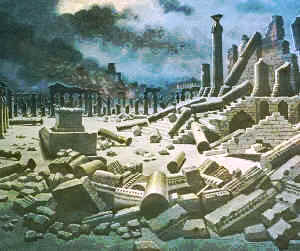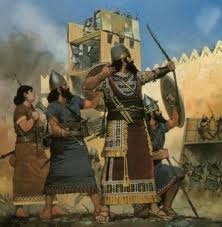The Suffering Servant of Isaiah 53
 In conjunction with our Ministries’ remembrance of the Holocaust, we have decided to present to your attention our Sabbath reflection on the identity of the Suffering Servant described in the prophecy of Isaiah 53. Some of the material for this particular article is, therefore, coming from the previous reflection dedicated to the history and horrors of the world’s persecution of the Jewish People. The central question for our today’s presentation is: “How could the Christian world claim to have worshiped and followed Jesus Christ, all the while persecuting the People of whom Jesus of Nazareth was an integral part?” In other words, how can the Christendom worship a Jewish Man and demonize the very nation for whom he rightly stands at the same time? In conjunction with our Ministries’ remembrance of the Holocaust, we have decided to present to your attention our Sabbath reflection on the identity of the Suffering Servant described in the prophecy of Isaiah 53. Some of the material for this particular article is, therefore, coming from the previous reflection dedicated to the history and horrors of the world’s persecution of the Jewish People. The central question for our today’s presentation is: “How could the Christian world claim to have worshiped and followed Jesus Christ, all the while persecuting the People of whom Jesus of Nazareth was an integral part?” In other words, how can the Christendom worship a Jewish Man and demonize the very nation for whom he rightly stands at the same time?
No other nation in the history of humankind has given more to the world in terms of ethical morality, knowledge of One God, literacy and patient endurance in the face of terrible sufferings than have the Jewish People. No other nation has suffered more unfounded prejudice, determined persecution and longer exiles than the People of the Book! No other nation on the face of the Earth has been a greater gravitational center of human attention and God’s miracles than have the sons of Israel.
 Ever since the times when Titus and his Roman troops destroyed Jerusalem and razed the Jewish Temple to the ground in 70 CE, the Nation of Priests have been scattered among the Gentiles of the Earth, spreading among the nations the knowledge of One God and His Law! Is it conceivable that the Great Sufferer of Isaiah’s prophecy is the People of Israel? We encourage you to examine the facts presented in this short article and study the Bible on your own as well. Our immovable conviction is that every honest student of the biblical text will be able to conclude that the aforementioned proposition is not only conceivable, - it is the only Genuine understanding of the prophecy! Knowing that Jesus Christ was a true Israelite and the Jewish Messiah to boot, he was definitely as much a part of his nation as Moses prior to him! Ever since the times when Titus and his Roman troops destroyed Jerusalem and razed the Jewish Temple to the ground in 70 CE, the Nation of Priests have been scattered among the Gentiles of the Earth, spreading among the nations the knowledge of One God and His Law! Is it conceivable that the Great Sufferer of Isaiah’s prophecy is the People of Israel? We encourage you to examine the facts presented in this short article and study the Bible on your own as well. Our immovable conviction is that every honest student of the biblical text will be able to conclude that the aforementioned proposition is not only conceivable, - it is the only Genuine understanding of the prophecy! Knowing that Jesus Christ was a true Israelite and the Jewish Messiah to boot, he was definitely as much a part of his nation as Moses prior to him!
Before we unpack Isaiah’s powerful oracles, allow me to adduce the words of another respected biblical prophet as a theological “warm-up” for our reflection: “These are the words the LORD spoke concerning Israel and Judah: “This is what the LORD says: . . . “‘In that day,’ declares the LORD Almighty, ‘I will break the yoke off their necks and will tear off their bonds; no longer will foreigners enslave them. Instead, they will serve the LORD their God and David their king, whom I will raise up for them. “‘So do not be afraid, Jacob my servant; do not be dismayed, Israel,’ declares the LORD. ‘I will surely save you out of a distant place, your descendants from the land of their exile.” (Jer. 30:4-5, 8-10) – In unison with all the other prophets of the Almighty, Jeremiah envisions Israel’s restoration at the end of time! Did you notice, by the way, who is the bearer of the appellation of God’s “servant” in Jeremiah’s prophecy? (See also Jer. 46:27)
Servant Songs
 The words of Isaiah 53 have long been identified by Christian theologians as the fourth “Servant Song” in that lengthy prophetic book. The first three “songs” are found in the preceding chapters 42-49. Since the truest principle of biblical interpretation is “inter-textuality,” which allows the Bible to speak for itself, we should take a careful look at what all these passages tell us in their proper context and in relation to each other. This way we will avoid one of the most pernicious traits of Christian biblical exegesis, namely “proof-texting,” which entails ripping various bits and pieces of the biblical text out of their respective context and twisting them so as to make them conform to the faulty Church dogmas and beliefs! The words of Isaiah 53 have long been identified by Christian theologians as the fourth “Servant Song” in that lengthy prophetic book. The first three “songs” are found in the preceding chapters 42-49. Since the truest principle of biblical interpretation is “inter-textuality,” which allows the Bible to speak for itself, we should take a careful look at what all these passages tell us in their proper context and in relation to each other. This way we will avoid one of the most pernicious traits of Christian biblical exegesis, namely “proof-texting,” which entails ripping various bits and pieces of the biblical text out of their respective context and twisting them so as to make them conform to the faulty Church dogmas and beliefs!
First, we should understand that the division of the Bible into chapters and verses was a much later invention. Thus, the fourth “Servant Song” actually begins in Isaiah 52:13. (I would not put it past theologians of Christendom that the numbering of chapters in this case is deliberate, - it helps make the identity of the Servant more cryptic and, therefore, more useful to the ends of the Church).
Being astute Bible students, however, we shall start our reading in chapter 52, placing the text in its logical context: “Behold, My Servant shall deal prudently; He shall be exalted and extolled and be very high. Just as many were astonished at you, so His visage was marred more than any man, and His form more than the sons of men . . . He is despised and rejected by men, a Man of sorrows and acquainted with grief. And we hid, as it were, our faces from Him; He was despised, and we did not esteem Him. Surely He has borne our griefs and carried our sorrows; Yet we esteemed Him stricken, smitten by God, and afflicted. But He was wounded for our transgressions, He was bruised for our iniquities; The chastisement for our peace was upon Him, and by His stripes we are healed.” (Is. 52:13-14; 53:3-5) –
This is one of the most favored texts used by our Christian missionary friends in their attempts to convert Jewish people to the fold of Trinitarian Christianity! Their fault lies not in the fact that they attribute this prophecy to the Crucified Messiah. Their mistake is in failing to see the bigger picture, (often deliberately), by refusing to view the oracles in their intended setting and appropriate context!
Ever since the times when the “Replacement Theology” became an established ideology of the Church, this text has been understood by Christianity as applying exclusively to Jesus as God’s Suffering Servant. As we have stated earlier, the Messiah of Israel is definitely in this picture as a true son of Israel. As an Israelite without guile or deceit, he is part of God’s covenantal people, and, therefore, part of this prophetic oracle as well! What is really imperative for us at this point is to ascertain as to whom God calls “My Servant” in His unchangeable Word! Let us untwist the Christianity’s Gordian Knot of Isaiah’s prophecies. We encourage you to read Isaiah 41 through 55 as a unit in order to get a complete and undistorted picture of Isaiah’s words!
Isaiah 41
The text is very clear: “But you, Israel, are My servant, Jacob whom I have chosen, the descendants of Abraham My friend. You whom I have taken from the ends of the earth, and called from its farthest regions, and said to you, ‘You are My servant, I have chosen you and have not cast you away: Fear not, for I am with you; Be not dismayed, for I am your God.” (Is. 41:8-10) – Well in advance of the climactic “Servant Song” of Isaiah 53, these verses begin to lay down the foundation for the proper biblical understanding of the theme of the Suffering Servant.
Isaiah 42
 Countless Doctoral Dissertations in Theology have been composed on the basis of Isaiah 42:1-9. In fact, one of my Seventh-day Adventist friends is working right now on developing his PhD thesis from these very verses. As true sons of Christendom, however, they neglect to see the passage in its context. Here is the passage, which they believe refers exclusively to Jesus Christ: “Behold! My Servant whom I uphold, My Elect One in whom My soul delights! I have put My Spirit upon Him; He will bring forth justice to the Gentiles. He will not cry out, nor raise His voice, nor cause His voice to be heard in the street. 3 A bruised reed He will not break, and smoking flax He will not quench; He will bring forth justice for truth.” (Is. 42:1-3) – The beauty of the Bible lies in the fact that it is an objective document, portraying its characters in an unbiased way. Isaiah’s prophecies are in no way an exception from this rule. Countless Doctoral Dissertations in Theology have been composed on the basis of Isaiah 42:1-9. In fact, one of my Seventh-day Adventist friends is working right now on developing his PhD thesis from these very verses. As true sons of Christendom, however, they neglect to see the passage in its context. Here is the passage, which they believe refers exclusively to Jesus Christ: “Behold! My Servant whom I uphold, My Elect One in whom My soul delights! I have put My Spirit upon Him; He will bring forth justice to the Gentiles. He will not cry out, nor raise His voice, nor cause His voice to be heard in the street. 3 A bruised reed He will not break, and smoking flax He will not quench; He will bring forth justice for truth.” (Is. 42:1-3) – The beauty of the Bible lies in the fact that it is an objective document, portraying its characters in an unbiased way. Isaiah’s prophecies are in no way an exception from this rule.
Those of my Christian friends, who insist that this particular passage applies exclusively to Jesus Christ, ought to examine the entire chapter 42 of Isaiah’s book. Just a few verses down the line, we read the following: “Who is blind but My servant, and deaf like the messenger I send? Who is blind like the one in covenant with Me, blind like the servant of the LORD? You have seen many things, but you pay no attention; your ears are open, but you do not listen.” (Is. 42:19-20, NIV) - First, I chose to quote this passage from the NIV translation, simply because the NKJV is atrocious in its attempt to twist the original text. Second, you should tell me if this passage can be applied to the Second Person of the Divinity? (Please, read through the text carefully!)
It can only refer to the LORD’s covenantal people Israel! Otherwise the Perfect Deity is no longer perfect but blind and deaf instead! I think we can safely agree that no book in the Bible and none of Christian apologetics teach that Jesus was blind and deaf either in the literal meaning of these words or figuratively. How can it be that so many pointless PhD dissertations have been written and defended on the basis of Isaiah 42? I think this truly exemplifies the religion called Christianity today, - it is baseless, null and void!
Isaiah 43
In Isaiah 43 we read: “But now, this is what the LORD says— He who created you, Jacob, He who formed you, Israel: “Do not fear, for I have redeemed you; I have summoned you by name; you are Mine . . . “You are My witnesses,” declares the LORD, “and My servant whom I have chosen, so that you may know and believe Me and understand that I am He. Before Me no god was formed, nor will there be one after Me. 11 I, even I, am the LORD, and apart from Me there is no Savior.” (Is. 43:1,10-11) –Did you hear who the real Savior is? He is also uniquely One! Do you embrace some strange three-headed or three-bodied Deity in your devotion?
Isaiah 44
Chapter 44 lifts up the uncompromised truth once again: “But now listen, Jacob, My servant, Israel, whom I have chosen. 2 This is what the LORD says— He who made you, who formed you in the womb, and who will help you: Do not be afraid, Jacob, My servant, Jeshurun [Israel], whom I have chosen . . .“This is what the LORD says— Israel’s King and Redeemer, the LORD Almighty: I am the first and I am the last; apart from Me there is no God. . .“Remember these things, Jacob, for you, Israel, are My servant. I have made you, you are My servant; Israel, I will not forget you.” (Is. 44:1-2,6,21) – Can the LORD have been more specific and emphatic as to the identity of His Servant? You may have also noticed that the entire Book of Isaiah sounds as if the LORD were crying out to His people, calling upon them to worship and obey no other so-called “gods” or “lords.”
Isaiah 45
Addressing King Cyrus as one of His “messiahs” or “anointed ones”, God declares: “I will give you hidden treasures, riches stored in secret places, so that you may know that I am the LORD, the God of Israel, who summons you by name. For the sake of Jacob My servant, of Israel My chosen. . .” (Is. 45:3-4) – As we know both from the Scriptures and historically, Cyrus’s mission was to release the captive Israelites and provide them with a safe passage home to Israel! Although Cyrus was the King over a mighty Persian Empire, his sole purpose in life was to serve the people of Israel and their God! He is also called “My Anointed,” (“Messiah” in Hebrew), by the LORD of Heaven. Does that mean we should also worship Cyrus? Do you see a parallel with what the Christianity has invented?
Isaiah 48
Issuing the call for Israel’s deliverance, Isaiah proclaims: “This is what the LORD says— your Redeemer, the Holy One of Israel: “I am the LORD your God . . .Leave Babylon, flee from the Babylonians! Announce this with shouts of joy and proclaim it. Send it out to the ends of the earth; say, “The LORD has redeemed his servant Jacob.” (Is. 48:17,20) – Jacob (Israel) is named as God’s servant once again here! I do not mean to bore you with such a long list of witnesses testifying to the true identity of God’s Servant. My goal is to show you the overwhelming evidence supporting the truth that the Suffering Servant of Isaiah 53 is the People of Israel, first and foremost!
Isaiah 49
Many older Christian translations twist the wording of the passage in Isaiah 49 with the purpose of making it sound less straightforward and, therefore more cryptic. When things are not quite clear, lay people of the Church can be led to believe almost anything. In our presentation, we are using a lucid and honest rendition of the Hebrew text done by the NIV Bible translators: “Listen to me, you islands; hear this, you distant nations: before I was born the LORD called me; from my mother’s womb he has spoken my name . . . He said to me, “You are my servant, Israel, in whom I will display My splendor.” . . . “It is too small a thing for you to be My servant to restore the tribes of Jacob and bring back those of Israel I have kept. I will also make you a light for the Gentiles, that My salvation may reach to the ends of the earth.” (Is. 49:1,3,6) – Do you still have any questions as to who the Servant of God is in Isaiah’s prophecies? All the faithful monotheists within the nation of Israel are collectively God’s faithful servant, through whom He will fulfill the final restoration of His people and bring the knowledge of One God to the ends of the Earth (Habakkuk 2). As the Messiah of Israel, Yeshua HaMashiah is undoubtedly among the LORD’s faithful people as well!
In light of such abundant evidence pointing unmistakably to the identity of the LORD’s Suffering Servant in the Book of Isaiah, the burning question to ask is: “How can Christian theologians and “thinkers” simply disregard the weight of biblical proof in favor of their fanciful and unbiblical interpretations?” Why don’t they proclaim a straightforward fact that just as in case with the name of “Immanuel,” in which both the prophecy and its language refer, first and foremost, to one of Isaiah’s children, and only then to Jesus of Nazareth, so does the Suffering Servant of Isaiah’s oracles point unequivocally to the People of Israel, of whom the Messiah is only a part!?
Isaiah 52 through 54
Finally, it is essential to study carefully the surrounding chapters of Isaiah 53 in order to grasp a clear understanding of the "Suffering Servant." The context of Isaiah 53 immediately reveals that the prophet is speaking of the nation of Israel in the singular. The contiguous relationship between Isaiah 52 through 54 is evident through the common theme, poetic structure, and motif of the three chapters. The language and imagery of Isaiah 53 flow in the same vein as those in Isaiah 52 and 54. As in Isaiah 53, Isaiah 52 and 54 clearly identify Israel in the singular, suffering innocently as a result of injustice and wickedness of the gentile nations. In addition, all three of these powerful predictive chapters vividly describe the glorious redemption of Israel in full view of the gentiles, her former persecutors.
 For example, in Isaiah 52:4 the prophet recounts that "Assyria oppressed him [Israel] without cause." The theme of Israel’s oppression, (Israel is spoken of as a single individual), at the hands of the Gentiles is clearly developed in Isaiah 52. Isaiah 53 is but a logical and textual continuation of the preceding chapter! In the following chapter, the motif remains unchanged. In Isaiah 54, the prophet recounts how Israel, in the singular, is "despised," "forsaken," and "afflicted." These are the identical descriptions of the nation of Israel found in the previous chapter, Isaiah 53. In fact, it is so manifestly evident from these chapters that Isaiah 53 is speaking of the righteous remnant of Israel, that a great many Christian commentators unhesitatingly agree that this chapter speaks of no one else but the Almighty's Chosen People. For example, in Isaiah 52:4 the prophet recounts that "Assyria oppressed him [Israel] without cause." The theme of Israel’s oppression, (Israel is spoken of as a single individual), at the hands of the Gentiles is clearly developed in Isaiah 52. Isaiah 53 is but a logical and textual continuation of the preceding chapter! In the following chapter, the motif remains unchanged. In Isaiah 54, the prophet recounts how Israel, in the singular, is "despised," "forsaken," and "afflicted." These are the identical descriptions of the nation of Israel found in the previous chapter, Isaiah 53. In fact, it is so manifestly evident from these chapters that Isaiah 53 is speaking of the righteous remnant of Israel, that a great many Christian commentators unhesitatingly agree that this chapter speaks of no one else but the Almighty's Chosen People.
Isaiah 53
To make our presentation even more conclusive, we shall now bring forward a few potent textual witnesses from Isaiah 53. There are at least two textual hints in the following passage that would unmistakably identify the Servant as the righteous Remnant of Israel: "But the LORD chose to crush him by disease, That, if he made himself an offering for guilt, He might see offspring and have long life, And that through him the LORD's purpose might prosper.” (Is. 53:10)
The Hebrew word “זֶ֖רַע” (zerah), which appears in Isaiah 53:10, means "seed" and signifies one of the blessings bestowed on the Servant by the LORD. This Hebrew word can only refer to biological offspring when used in connection with a person's children. It is never used to denote children in a metaphoric or figurative sense, such as disciples. The Hebrew word that can refer to metaphoric children is “בֶּן” (ben). This is one of the strongest indicators that the text refers to the literal descendants of the People of Israel, pointing to the righteous remnant of Israel as the Servant of the LORD.
Another revealing clue is found in the Hebrew words “יַאֲרִ֣יךְ יָמִ֑ים” (ya'arich yamim), meaning "long life" or a "prolonged life." This Hebrew phrase is never used to refer to an eternal life which has no end, but rather speaks of a lengthening of days, which eventually come to an end. These Hebrew words are therefore never applied in the Jewish Scriptures to anyone who is to live forever. In Tanach, therefore, God is never said to have a long life (ya’arich yamim). In fact, the words ya'arich yamim appear in a number of places throughout the Hebrew Scriptures, including Deuteronomy 17:20, Deuteronomy 25:15, Proverbs 28:16, and Ecclesiastes 8:13. In each and every verse where this phrase appears, these words refer to an extended mortal life, not an eternal one.
When the Jewish Scriptures speak of an eternal, resurrected life, as in Daniel 12:2, the Hebrew words “לְחַיֵּ֣י עוֹלָ֔ם” (l'chayai olam) are used instead. The Hebrew text would present some insurmountable difficulties to anyone trying to make a claim that the prophecy contained in Isaiah 53 refers exclusively to Jesus of Nazareth. I am willing to contend that he is part of that prophecy by virtue of his being part of his People Israel and their Messiah as well!
Suffering Unjustly But With a Greater Purpose . . .
 Just like Jesus the Messiah, (who is but a representative of his Jewish people), suffered unjustly at the hands of his tormentors for a great purpose of human redemption, so did his own people suffered at the hands of many other nations for the sake of the world’s final redemption. In his letter to Colossians, the Apostle Paul proposes a mysterious explanation for his own sufferings: “I now rejoice in my sufferings for you, and fill up in my flesh what is lacking in the afflictions of Christ, for the sake of His body, which is the church . . .” (Colossians 1:24) – Why does Paul say that his sufferings fill up the measure that was not complete with Christ’s torments? Apparently Paul knew quite well that the Jewish people were the original and most complete representation of God’s Suffering Servant in the world! The doctrine of the all-sufficient sacrifice of Christ became the Church’s dogma alongside his presumed “Absolute Supremacy” as well, - they were later fabrications! Just like Jesus the Messiah, (who is but a representative of his Jewish people), suffered unjustly at the hands of his tormentors for a great purpose of human redemption, so did his own people suffered at the hands of many other nations for the sake of the world’s final redemption. In his letter to Colossians, the Apostle Paul proposes a mysterious explanation for his own sufferings: “I now rejoice in my sufferings for you, and fill up in my flesh what is lacking in the afflictions of Christ, for the sake of His body, which is the church . . .” (Colossians 1:24) – Why does Paul say that his sufferings fill up the measure that was not complete with Christ’s torments? Apparently Paul knew quite well that the Jewish people were the original and most complete representation of God’s Suffering Servant in the world! The doctrine of the all-sufficient sacrifice of Christ became the Church’s dogma alongside his presumed “Absolute Supremacy” as well, - they were later fabrications!
All the so-called “Servant Songs” of Isaiah are part of the prophet’s consoling soliloquy directed to God’s traumatized People of Israel. They unveil in no uncertain terms the glorious redemption of the righteous remnant of Israel, whom the prophet identifies as God's servant over and over again. Isaiah 53 is the culmination of Isaiah's moving narrative. It describes the Almighty's servant-nation who, after a brutal and seemingly endless exile, is cleansed, restored and elevated in the sight of her former oppressors worldwide – the gentile nations.
The prophecy allows us a glimpse of the surprised gentile kings and rulers of nations at the End of Days as they finally behold the righteous remnant of the Jewish people raised up and glorified. The final redemption of Israel is not what the world at large has expected. The astonished reaction of the gentiles to the Messianic Age is a common theme throughout the Hebrew Prophets, and the baffled reaction of the nations is recorded in Isaiah 53rd with greater clarity than any other chapter in the Bible.
 What startling news will astound the world's leaders? What will they finally grasp that will amaze them beyond measure? Everything that they have ever heard or considered is in stark contrast to what they will finally witness in the Messianic Age. They will place their hands over their mouths in numbed bewilderment as they witness the glory of the remnant of the Jewish people, finally vindicated and redeemed by the "arm of the Lord" (53:1). “So shall he startle many nations; kings shall shut their mouths because of him; for that which has not been told them they shall see, and that which they have not heard they shall understand. Who has believed what we have heard? And to whom has the arm of the Lord been revealed?” (Is. 52:14-15) What startling news will astound the world's leaders? What will they finally grasp that will amaze them beyond measure? Everything that they have ever heard or considered is in stark contrast to what they will finally witness in the Messianic Age. They will place their hands over their mouths in numbed bewilderment as they witness the glory of the remnant of the Jewish people, finally vindicated and redeemed by the "arm of the Lord" (53:1). “So shall he startle many nations; kings shall shut their mouths because of him; for that which has not been told them they shall see, and that which they have not heard they shall understand. Who has believed what we have heard? And to whom has the arm of the Lord been revealed?” (Is. 52:14-15)
In Isaiah 53:2-8, the kings of nations continue to humbly express their heartfelt confession. Only now they finally conclude that the nation of Israel suffered throughout their long and bitter exile as a result of the mindless sins of their own citizens. In the past, these world leaders surmised that the Jews were stricken and smitten by God because they stubbornly rejected the gods and religions of other nations. But now, as they bear witness to the glorious messianic redemption, they are astounded. They will finally grasp that Israel suffered as a result of the destructive arrogance and devastating reckless behavior of their own peoples.
Conclusion of the Matter:
If you truly believe that after Christ’s humiliation and death at the hands of Roman Gentiles he was exalted to the right hand of majesty and is coming back to reign as King of kings and Lord of lords, you should also understand that the same destiny awaits God’s faithful monotheists, who never succumbed to any idolatry and satanic lies, which include the Trinitarian Christianity with all of its accompanying falsehood! Please, read carefully the stunning prophecy of Isaiah 53: “Yet it was the LORD’s will to crush him and cause him to suffer, and though the LORD makes his life an offering for sin, he will see his offspring and prolong his days, and the will of the LORD will prosper in his hand. After he has suffered, he will see the light of life and be satisfied; by his knowledge My righteous servant will justify many, and he will bear their iniquities.Therefore I will give him a portion among the great, and he will divide the spoils with the strong, because he poured out his life unto death, and was numbered with the transgressors. For he bore the sin of many, and made intercession for the transgressors.” (Isaiah 53:10-12)
 Where do you stand today both in your ideological thinking and practical position? Are you with the Servant of the LORD or in a different camp?! Where do you stand today both in your ideological thinking and practical position? Are you with the Servant of the LORD or in a different camp?!
Shalom and Happy Sabbath!
|